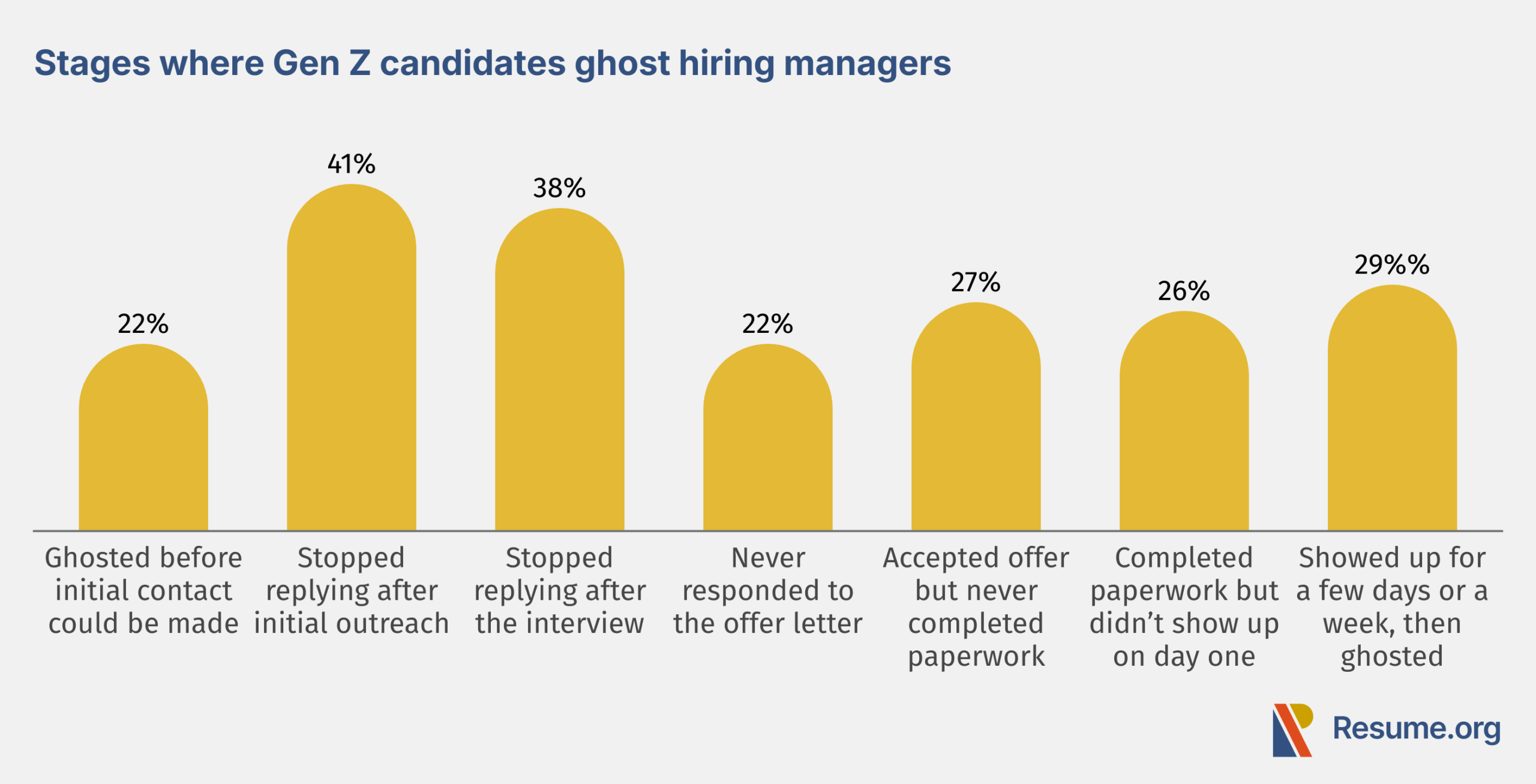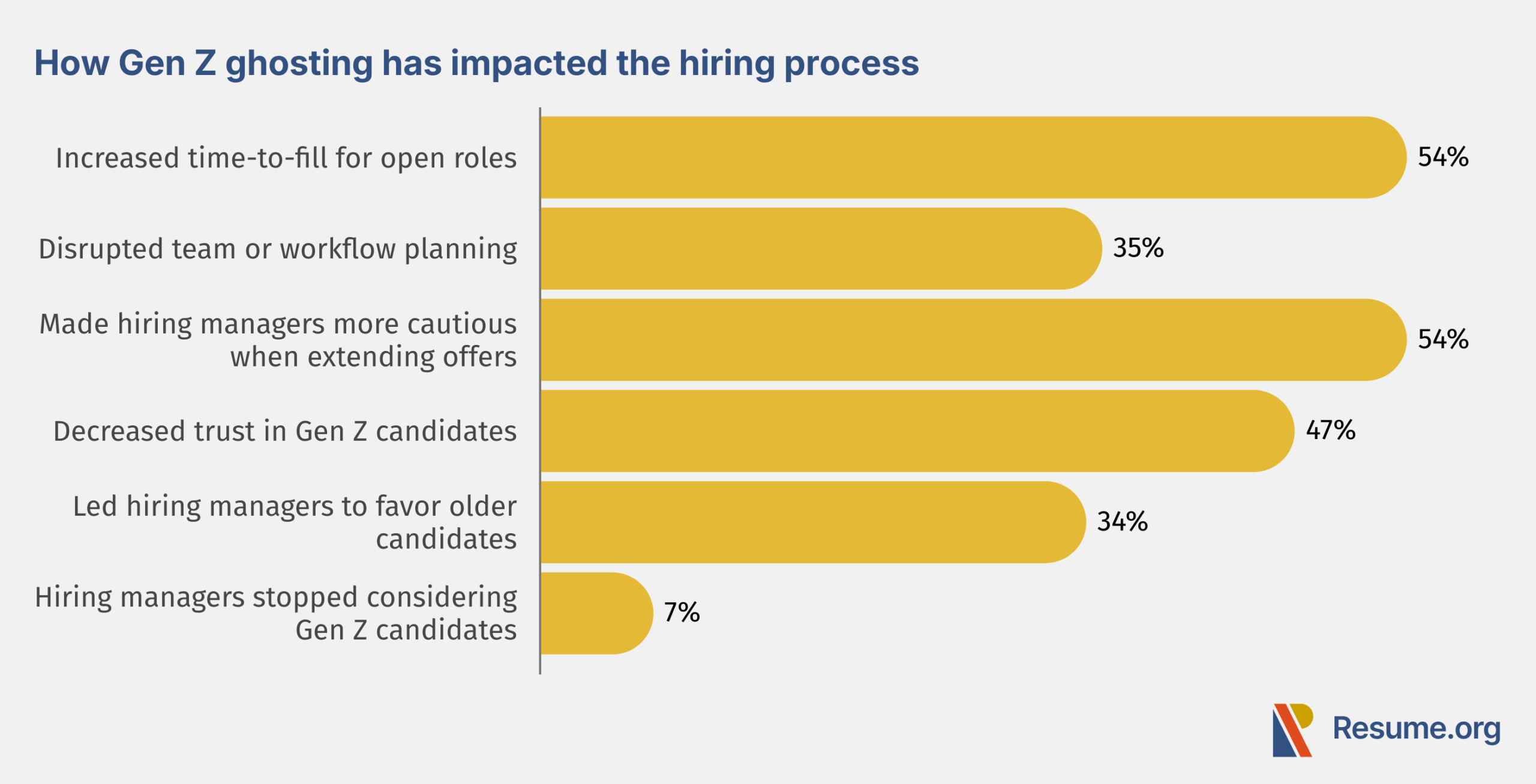Gen Z candidates are gaining a reputation for ghosting, and in today’s job market, it’s not going unnoticed.
Resume.org surveyed 1,115 U.S. hiring managers in June 2025 to understand how Gen Z ghosting affects recruitment efforts, how managers are responding, and what both sides can do to rebuild trust.
Key findings:
- 54% of hiring managers have been ghosted by a Gen Z candidate after extending a job offer
- 66% of hiring managers say Gen Z ghosting has made the hiring process more difficult
- 1 in 10 hiring managers say they no longer consider Gen Z candidates at all
- 9 in 10 hiring managers say Gen Zers are more likely to ghost than other generations
54% of Hiring Managers Have Been Ghosted by Gen Z Candidates After Extending an Offer
Gen Z isn’t just leaving employers on read; they’re vanishing after landing the job. According to our survey, 54% of hiring managers say they have been ghosted by a Gen Z candidate after extending an offer. The ghosting plays out in different ways: 27% say candidates accept the offer but never complete the necessary paperwork, 26% say they complete the paperwork but do not show up on day one, and 29% say candidates show up for a few days or a week before disappearing without notice.
The silent treatment isn’t limited to post-offer stages. Nearly one-quarter of hiring managers (22%) say they’ve had candidates ghost before they can even make initial contact. Another 41% say candidates stop replying after that initial outreach, 38% say communication drops off after the interview, and 22% say candidates never respond to the offer letter at all.

“Gen Z ghosting employers is not just a Gen Z issue. It reflects a hiring system that has lost their trust,” says Kara Dennison, Resume.org’s Head of Career Advising. “This generation values transparency, speed, and authenticity. When companies drag out timelines or misrepresent their culture, Gen Z candidates disengage or ghost entirely. Especially after watching older generations endure layoffs, instability, and toxic work environments.”
1 in 10 No Longer Consider Gen Z Candidates
Among hiring managers who have been ghosted by Gen Z candidates, 66% say the experience has made the hiring process more difficult for their company. More than half (54%) say ghosting has increased the time it takes to fill open roles, and the same percentage say it has made them more cautious when extending offers. Nearly half (47%) say it has decreased their trust in younger candidates. Additionally, 35% say it has disrupted team or workflow planning, 34% now favor older candidates, and 7% say they no longer consider Gen Z candidates at all.

To prevent ghosting, companies are trying a range of strategies. Just over half (52%) of hiring managers say they emphasize commitment expectations early in the process. Another 43% conduct friendly check-ins between the offer and start date. About 37% take a more casual or conversational approach during interviews, while 34% delay extending formal offers until later in the process. A smaller group, 24%, incorporates social or team-based onboarding activities to build engagement and reduce no-shows.
“Giving up on Gen Z candidates is a risky move; they are the future of the workforce. Writing off an entire generation not only shrinks the talent pool, but it risks age bias and long-term talent gaps,” says Dennison.
Dennison adds that these challenges highlight a deeper issue in hiring culture. “To reduce ghosting, companies need to reevaluate outdated processes, such as slow timelines, poor communication, or unclear expectations. Gen Z is more likely to commit when they experience authenticity, speed, and mutual respect. Instead of resisting change, organizations should adapt and use this opportunity to build lasting loyalty.”
Hiring Managers Say Gen Zers Ghost Far More Than Older Generations
The majority of hiring managers believe Gen Z candidates are more likely to ghost than those from older generations. Just over half (53%) say Gen Z is somewhat more likely to ghost, while 33% say they are much more likely to do so.
To assess reliability in Gen Z candidates, hiring managers look for clear signs of engagement and follow-through. The top indicators include showing up on time to interviews (68%), consistent communication throughout the process (65%), demonstrating interest by asking questions (64%), and prompt replies to emails or messages (62%). Additionally, 36% say they view thank-you or follow-up notes as signs of dependability.
“To build trust and reassure employers, Gen Z candidates can focus on consistency, clarity, and proactive engagement throughout the hiring process. Showing up on time, replying promptly to messages, and maintaining steady communication are baseline signals of professionalism that go a long way and are expected by employers. Asking thoughtful questions during interviews demonstrates genuine interest and helps employers see the candidate as invested, not just exploring options. Additionally, sending a brief thank-you note or follow-up email after the interview is another simple but powerful way to stand out and signal reliability, excitement, and commitment,” says Dennison.
“Ultimately, it’s not about overperforming; it’s about showing employers that you respect their time and are serious about the opportunity. In a job market where ghosting has created mistrust on both sides, small actions like maintaining communication can make a big impact,” Dennison adds.
Methodology: Resume.org commissioned this survey, which was conducted via Pollfish in June 2025. A total of 1,115 U.S. workers participated. Demographic and screening criteria ensured that all respondents hold management-level positions and are involved in hiring.
To view all of our other research and studies go to our research page.
Resume.org offers free, HR approved resume templates to help you create a professional resume in minutes. Choose from several template options and even pre-populate a resume from your profile.